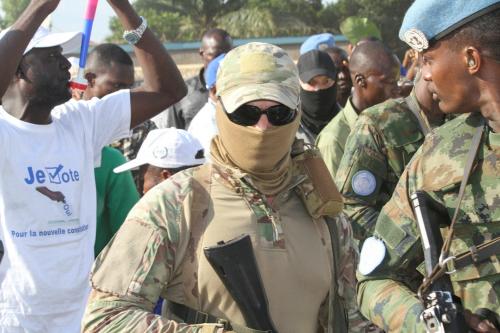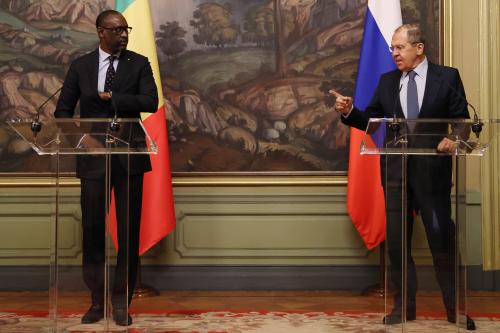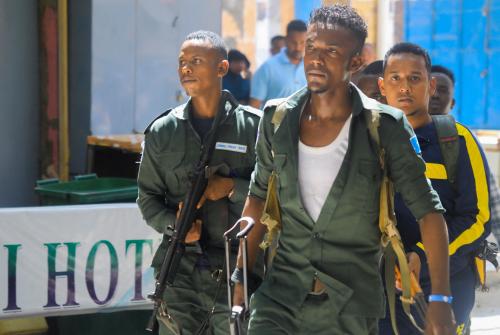This commentary is the first in a two-part series. In the first commentary, Vanda Felbab-Brown lays out how the coup in Niger has unfolded and, in response to Western and regional reactions, veered toward an anti-Western posture. In the second, she describes U.S. interests in Niger, and the range of scenarios ahead.
What started as an internally-driven coup in Niger on July 26, West Africa’s seventh in three years, has rapidly come to threaten Western interests. The fast post-coup developments mirror those in Mali and Burkina Faso and highlight the difficulty — and perhaps impossibility, in the short term anyway — of sustaining the West’s hard security and geostrategic interests and simultaneously its commitment to democracy in various parts of Africa.
How and why the coup unfolded
For over two years, tensions simmered between Niger’s president, Mohamed Bazoum, and Abdourahamane “Omar” Tchiani, the head of the presidential guard that conducted the putsch, even though both were important actors in the presidency of Mahamadou Issoufou from 2011-2021.
Bazoum served as Issoufou’s foreign minister from 2011-16 and interior minister from 2016-2021. Tchiani headed the presidential guard during Issoufou’s entire decade in office. Although Tchiani is close to Issoufou, and Issoufou supported Bazoum’s candidacy, Tchiani never warmed to Bazoum. The brewing instability was also visible in a coup attempt in 2021 when Bazoum was about to be sworn in after winning the election.
Bazoum sought to diminish the Tchiani threat by supposedly preparing to fire Tchiani and by reducing the budget of the presidential guard. Simultaneously, Bazoum increased the military’s budget overall to counter the large terrorism threats Niger faces and to cultivate support elsewhere within the military. But Niger’s military threw its hat in with the putschists.
Fallaciously, and according to the script of West Africa’s recent junta takeovers, the putschists justified their move as necessary because of Bazoum’s inadequate security policies. In fact, Bazoum’s counterterrorism approach and his strong cooperation with the West were improving the security picture.
Did Russia have a role in the coup?
Russia does not seem to have played a direct role in the coup. But for several years, Russia has run the same disinformation campaigns in Niger as elsewhere in West Africa, agitating against France and the United States, accusing them of colonialism, and instigating polarization and dissent.
The Russian propaganda has fertile ground: not just because of Niger’s crushing poverty and the country’s poor media literacy, but also because Issoufou had repeatedly resorted to heavy-handed tactics against protesters and opponents, to which the West closed its eyes in order to maintain military bases, uranium access, and Niger’s cooperation to pen in migrants heading to Europe.
Still, at first the junta did not appear to be principally motivated by an anti-Western agenda, even though Bazoum had been close to and supported by the West.
The West’s response rapidly hardened around rejecting the possibility of conducting business as usual with the junta and demanding the restoration of Bazoum’s government. The Economic Community of West African States (ECOWAS) upped the anti-junta ante. In turn, the junta’s anti-Western orientation intensified, with anti-France and anti-ECOWAS protests, an attack on the French embassy, and the display of pro-Russia symbols.
However, if the West had compromised its democratic values and commitments, as the United States did in Egypt following the coup there in 2013, the junta might still have drifted into an anti-Western, pro-Russia-China orbit. After all, France tried, but was unable to work with the junta that seized power in Mali in 2021.
The West’s and ECOWAS’s responses
Under Nigeria’s leadership, ECOWAS dramatically threatened military invention to dislodge the junta if it did not give up power by August 6, though the organization later backpedaled somewhat by labeling an intervention its last resort.
Yet, the Nigerien junta did not cave and it is not clear that ECOWAS will be able and willing to mount an intervention. For one thing, there is no unity among ECOWAS members. Only Senegal, Côte d’Ivoire, and Benin have promised troops to join a Nigeria-led anti-junta intervention, but the Nigerian Senate declined to authorize the use of Nigerian forces for the intervention. Meanwhile, the junta-led Mali, Burkina Faso, and Guinea, all ECOWAS members, expressed solidarity with Niger’s junta. Mali and Burkina Faso even declared that any intervention against Niger would be considered a war against them.
ECOWAS has also sent several diplomatic delegations to the capital Niamey to negotiate a handover of power back to the civilians, one, ironically, led by a non-ECOWAS putschist President Mahamat Idriss Deby of Chad, another possible member of an intervention coalition, but they haven’t swayed the junta.
The West African regional organization also imposed a set of tough economic sanctions on Niger. Nigeria has cut electricity supply, on which Niger relies.
Although the United Nations said that humanitarian aid would continue, France and the EU have suspended all economic aid amounting to $554 million. Niger receives $2 billion a year from abroad, some 40% of its budget.
France also suspended its military operations, and promised unspecified support for an ECOWAS intervention, though extraction at uranium mines operated by the French company Orano has continued. Niger is the EU’s second-largest supplier of the ore.
Various European countries have also evacuated their citizens out of Niger.
The Biden administration has condemned the seizure of power in Niger, threatened the withdrawal of all U.S. aid if the constitutional order is not restored, paused some assistance, and demanded an immediate release of Bazoum. Yet Washington has refrained from calling the putsch a coup. These linguistic gymnastics seek to preserve the U.S. ability to delay and ideally avoid imposing sanctions on Niger, thus losing a critical platform for counterterrorism operations. In addition to training Nigerien forces to suppress the spread of diverse and potent ISIS- and al-Qaida-linked groups, the 1,000-man-strong U.S. military contingent in Niger runs a very important counterterrorism drone base in Niger. Washington wants some acceptable political deal in Niger, so it does not to have to slam full sanctions and withdraw forces.
The junta’s countermeasures
In a counterresponse to the EU, Niger’s junta announced on August 3 that it was revoking a panoply of military agreements with France. Without a change in France’s posture, its 1,500 troops in Niger will thus need to depart, significantly shrinking the West’s military capacity in a part of the world with an intensifying, lethal, and churning terrorism threat.
When putschist Mali and Burkina Faso (two crucial counterterrorism areas into which billions of military and economic investments had been pumped) kicked out the French military, Niger became the last bastion of French and U.S. counterterrorism operations in the Sahel. Unlike Germany’s, Italy’s, and Canada’s military deployments to Niger, France had not just been training the Nigerien military, but had actually been fighting terrorist groups in Niger’s borderlands with Mali and Burkina Faso.
Niger also suspended the broadcasts of French state-funded international news outlets France 24 and RFI. In what was already a highly controlled and distorted information environment — media freedoms were hardly stellar even previously in Niger — the shutdown of Western media sources further enables Russian and the Wagner Group’s propaganda and agitation.
And Wagner readily jumped in: From the sidelines of the Russia-Africa Summit, Yevgeny Prigozhin hailed the coup as anti-colonialism, as did the Russian arms trafficker Viktor Bout. Despite plenty of evidence to the contrary from Mali and the Central African Republic, Wagner’s Telegram channels also boasted that 1,000 Wagner mercenaries would restore order and defeat the terrorist groups. The Nigerien junta has reportedly accepted the offer, though no details have been announced.
Russia and China’s official posture
The Kremlin’s official posture has been more measured. Since Russia must also cater to other African audiences like Kenya, already angered by Russia smashing the Black Sea Grain Initiative (which allowed Ukraine to export grain and thus keep global prices lower and food accessible to African populations), and South Africa, the Russian government couldn’t hail the putschists, much as it rejoices in the prospect of the West leaving. But Russia has indirectly spoken against an ECOWAS intervention.
The byplay between Wagner and the Russian government again reveals the continuing utility of Wagner to Russia.
Readily willing to embrace authoritarian leaders in Africa, but not directly provoking internal polarization like Russia, China has been insipid in its statements. It has called on “relevant parties in Niger to act in the fundamental interest of the country and its people, solve differences peacefully through dialogue, restore order at an early date, and safeguard the overall peace, stability and development of the nation.” Beyond China’s overall officially-stated (if extensively-violated) posture of not interfering in other countries’ internal affairs, the blandness of the statement also reflects China’s strong economic interests in Niger’s oil, gas, and uranium sectors and its position as Niger’s second largest foreign investor, after France. Whether or not the junta stays (likely), China doesn’t want to jeopardize its economic investments.
No straightforward path to civilian order
There is no straightforward path or likely scenario by which a civilian order could be restored in Niger. Caveat emptor: A Nigeria-led military intervention could end up being a mire with bad blowback into Nigeria itself. Short of that, the options range from unsatisfactory to deeply troubling.
Niger may well not be the last place in Africa where a coup may take place on quite quick timelines. Sierra Leone and the Democratic Republic of Congo, with likely-fraught upcoming elections, are just two immediate possibilities. But there are also coup risks against established authoritarians with a veneer of electoral victories, like in Uganda.
For the West, avoiding a bitter tradeoff between commitment to democracy and security and strategic interests will be increasingly hard.
The Brookings Institution is committed to quality, independence, and impact.
We are supported by a diverse array of funders. In line with our values and policies, each Brookings publication represents the sole views of its author(s).








Commentary
How the Niger coup unfolded
August 8, 2023